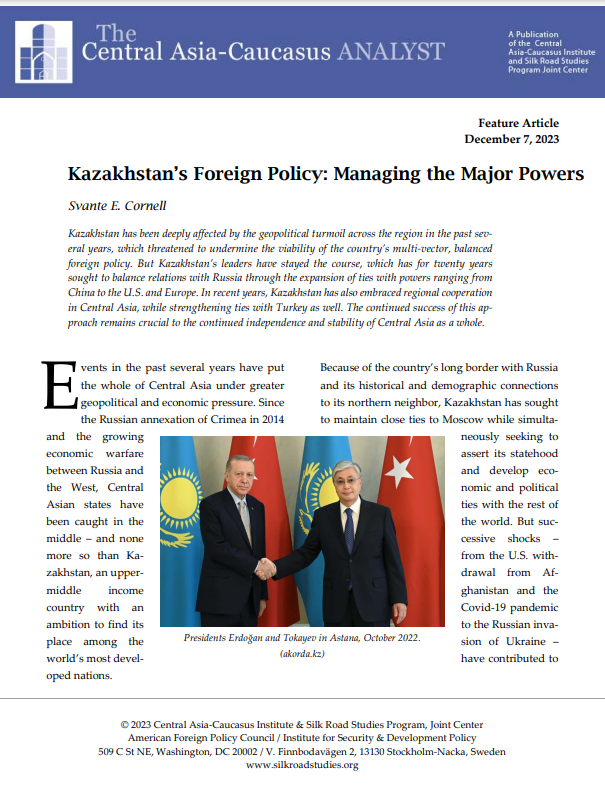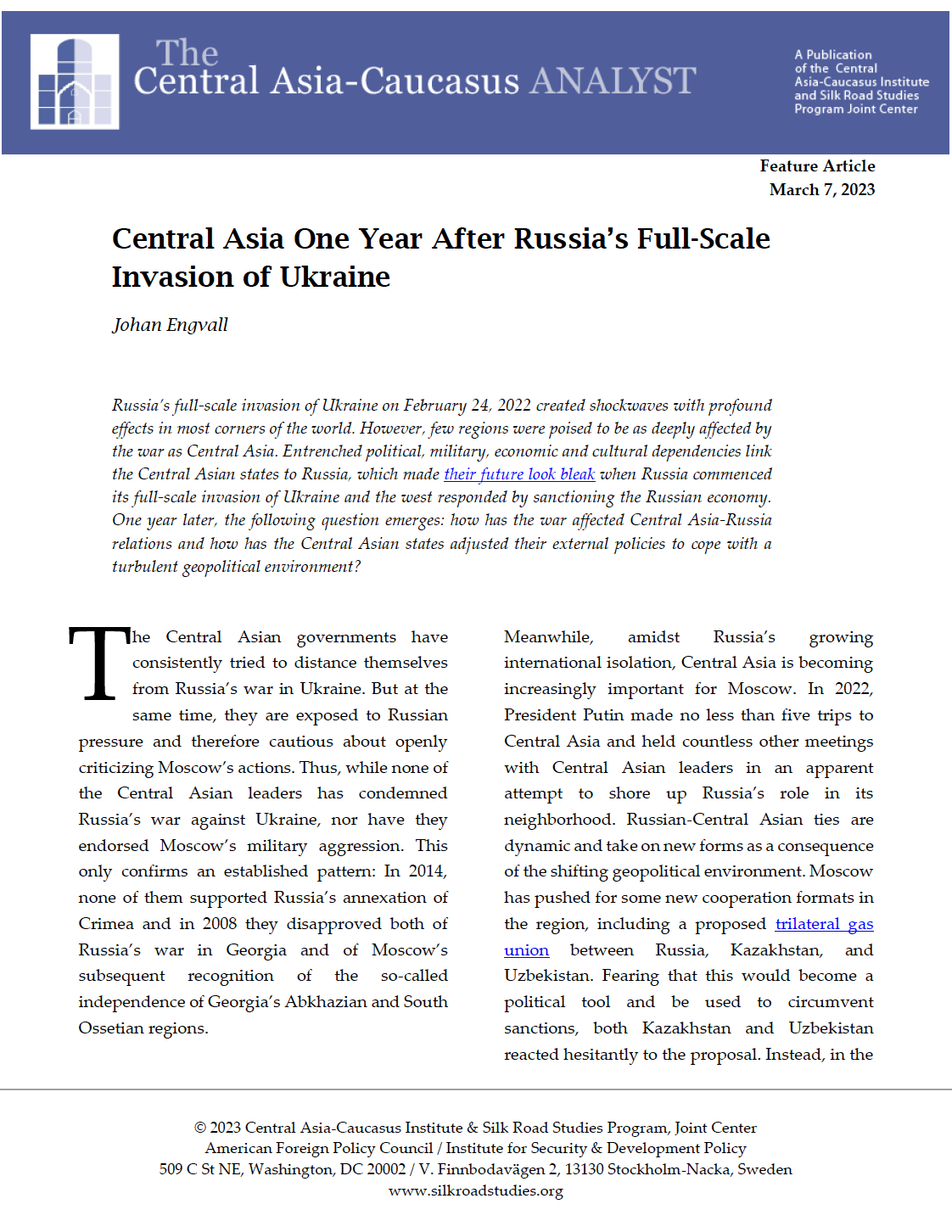Georgia on Trump's Mind
By Stephen Blank
It would currently be very much in the U.S. interest to reinvigorate relations with Georgia. Despite Georgia’s growing submission to Russian policy, its mounting anti-democratic repression, and pervasive corruption, opportunities exist that can justify a U.S. policy initiative towards the country. Specifically, Trump can emulate his achievement of inserting U.S. influence over trade routes like the Zangezur corridor to resuscitate the U.S. effort to develop Georgia’s Anaklia port complex on the Black Sea. Success would establish a lasting U.S. presence and provide a counterbalance to Sino-Russian influence. An enduring U.S. trade presence and even management of the primary land and sea corridors linking the Caucasus to both Central Asia and Europe could facilitate a far-reaching strategic transformation throughout these regions.

Image Credit: PICRYL
BACKGROUND: The U.S. is moving quickly to build on President Trump’s intervention in the war between Armenia and Azerbaijan and its resolution. A U.S. delegation recently travelled to Armenia to begin the implementation of the Trump Route for International Peace and Prosperity (TRIPP), which Washington, Baku, and Yerevan agreed to in August. The delegation has just announced an initial investment of US$145 million to begin building this road, thus confirming Washington’s presence in the Caucasus. Beyond this intervention, the administration is strengthening ties with Kazakhstan and Uzbekistan and may even be planning a trip there.
In Georgia, an enduring U.S. presence at Anaklia would have repercussions beyond its possible impact on Georgia’s domestic politics. Due to Ukraine’s success in driving the Black Sea Fleet out of the battle theater, Russia is building a strategic naval hub at Ochamchire in Abkhazia, which will clearly be an enduring threat to Georgia. Likewise, China’s large investments throughout the Black Sea region aim to obtain lasting economic-political influence over the entire littoral. Both these processes will clearly aim to exclude Western influence from Georgia and beyond. A U.S. presence in Anaklia would provide a check on both powers’ ambitions and preserve an option for all the states of the Caucasus and the Black Sea littoral in general. Even if the Trump Administration has no interest in or incentive to influence Georgian democratization, it does seek to expand U.S. economic presence in both the Caucasus and Central Asia to check China and Russia. Since Central Asia’s economic-political growth depends on its ability to trade in an unhampered way with the West through secure economic corridors leading to Europe, a U.S. presence in Anaklia, together with TRIPP and an enhanced U.S. position in Central Asia, likewise augments the economic-political independence of Central Asian states.
Several years ago, Georgia rejected plans that were already in place for a Western firm to build the port at Anaklia and awarded the contract to the China Communications Construction Company (CCCC). Yet despite that decision and the fact that the China Railway Tunnel Group is building a highway that would connect Western Georgia to Russia, and Chinese workers are constructing an East-West highway across Georgia, no port has been built. A report by Civic Idea, an independent Georgian think tank, points out that China’s interest in this deep-water port coincides with its presence at the port of Poti, which is part of the larger Free Industrial Zone. In both these cases, the report cited strong evidence of Georgian corruption at China’s expense, leading to delays in construction at Anaklia, even as the Western presence has been excluded.
IMPLICATIONS: Therefore, an opportunity exists for a U.S. initiative to recapture the contract for building a port at Anaklia. While this would require a strong negotiating team, it is nevertheless conceivable and desirable not only for the West but for other Central Asian and South Caucasus states. At present, the idea of the Middle Corridor seems to be the most likely vehicle for connecting China, Central Asia, and the Caucasus with Europe. TRIPP provides a major impetus to land-based trade for this intercontinental project. However, a passage through Anaklia not only benefits Georgia by connecting it to the Middle Corridor; it also offers a maritime route for shippers in both Europe and Asia that would increase trade and connectivity. The opportunity of sending bulk cargoes through the Black Sea would permit traders to reach more markets than those accessible exclusively by land-based trade and transport flows. Cargoes requiring maritime transport could originate in China or Central Asia, or in Romania, Bulgaria, Ukraine, and Russia (once peace is achieved in the current Russian war against Ukraine), and be shipped at reduced cost to any other member of the corridor. This would stimulate economic exchanges and reduce shipping costs, facilitating mutual cooperation on safeguarding either or both extensions of this corridor, thereby improving regional cooperation and security among the members.
Central Asian states, which are all seeking to utilize the Caspian Sea for expanded international trade to Europe, would profit greatly from a reliable, secure maritime passage westward. Uzbekistan, which is doubly landlocked, has called for a global pact guaranteeing transit and the creation of an international logistics forum for landlocked states. It is negotiating with its neighbors to buy ships and operate ferries on the Caspian Sea to buy and sell goods and overcome existing bottlenecks. To the extent that it can move cargoes to and from its neighbors on the Caspian Sea, the opening of a secure and reliable route from the Caspian ports of Azerbaijan to the Black Sea and thence to Europe or to reverse that process would constitute an enormous stimulus to its economy and those of its neighbors. Similarly, a reliably functioning port in Anaklia that is not beholden to Russo-Chinese or Georgian corruption would enhance Georgia’s economy, along with those of Armenia and Azerbaijan. TRIPP will undoubtedly stimulate Central Asian economic integration with Armenia and Azerbaijan, and a reliable maritime trade route through Anaklia will also similarly redound to Georgia’s benefit.
A secure U.S. position in Anaklia and its accompanying infrastructure also has potentially profound strategic implications. It would prevent both China and Russia from monopolizing Black Sea trade and geopolitics. Even if this port ultimately services large-scale Chinese trade going to Europe or from there to China, a U.S. presence would limit the amount of influence that China can wield in Georgia and beyond its borders. It would contribute to ensuring a stable series of long-term protocols that will benefit Georgia, along with other South Caucasus states and Central Asian traders. The economic benefits of a well-managed port complex would provide positive political incentives for Georgia, while the established presence of U.S. interests would act to deter Russia’s threat of military action and make it harder for Russia to operate militarily in the Black Sea.
Persuading the Trump Administration to make an offer to Georgia that it cannot refuse regarding Anaklia is admittedly a hard sell, especially when the Black Sea is a war zone and Georgian Dream is seeking to neutralize the domestic opposition with Moscow’s support. Nevertheless, inaction increases the costs to Washington and its allies, especially after putting down a marker in the Caucasus by investing in TRIPP. If Anaklia and the maritime arm of intercontinental trade and connectivity through the Caucasus are dominated by U.S. adversaries, they will use that opportunity to undermine TRIPP and negate its benefits. That outcome will surely undermine the Administration’s continuing investment in regional peace and could catalyze a return to warfare. Moreover, inaction also permits China and Russia to throttle the Administration’s now rising interest in Central Asia, as expressed in rumors of a presidential visit. It would also dash the hopes of Central Asian states for a more vigorous relationship of mutual benefit with Washington and Europe.
CONCLUSIONS: The Chinese and Russian rivalries with the U.S. are global. They are not confined to Taiwan, Ukraine, or even Europe. Moscow and Beijing are contesting U.S. power, influence, and values globally, not least in Central Asia and the Caucasus. Therefore, it is arguably in the interest of Washington and those states that wish to partner with it to enhance their partnerships when opportunities present themselves, even if economic and political risk is involved. A Western initiative linking Washington with interested European and Eurasian states regarding Anaklia is therefore probably less risky than has been imagined. The benefits of offering to develop Anaklia as a major port center managed according to international standards outweigh these risks in the new regional environment, thus meriting serious consideration.
AUTHOR’S BIO: Stephen Blank is a Senior Fellow at the Foreign Policy Research Institute, www.fpri.org.
Kadyrov's Chechnya: The State Within Putin's State
Laura Linderman and Anna Harvey
April 17, 2025
Kadyrov's Chechnya presents a deepening dilemma for Russia's federal state. Putin relies on Kadyrov for stability in exchange for unprecedented autonomy—a system where "personalized loyalty substitutes for institutional coherence." This arrangement has created a parallel power structure where Kadyrov implements religious legal codes, commands his independent Kadyrovtsy militia, and pursues contradictory foreign policies.
The paradox is clear: Moscow's strategy to suppress separatism has created a regional actor whose "loyalty is conditional and whose power increasingly transcends the bounds of federation." This precedent could inspire other republics like Tatarstan and Bashkortostan to seek similar arrangements. With Russia facing pressure from sanctions and war costs, Moscow's options are limited if Kadyrov's loyalty wavers.
Read Kadyrov's Chechnya: The State Within Putin's State (PDF)
Kadyrov and the Middle East: Threats to Russia's Strategy
Inal Sherip
April 3, 2025
Ramzan Kadyrov's transformation from a stalwart defender of Russia's policy of support for traditional Islam in the North Caucasus to an increasingly independent actor with divided loyalties represents a significant threat to Russia's regional security strategy. This shift, marked by his growing ties to Gulf monarchies and subtle adoption of the very religious practices he once opposed, signals a critical juncture in Russia's decades-long approach to managing Islamic influence in its southern territories.
Read Kadyrov and the Middle East: Threats to Russia's Strategy (PDF)
Kazakhstan’s Foreign Policy: Managing the Major Powers
By Svante E. Cornell
December 8, 2023
Kazakhstan has been deeply affected by the geopolitical turmoil across the region in the past several years, which threatened to undermine the viability of the country’s multi-vector, balanced foreign policy. But Kazakhstan’s leaders have stayed the course, which has for twenty years sought to balance relations with Russia through the expansion of ties with powers ranging from China to the U.S. and Europe. In recent years, Kazakhstan has also embraced regional cooperation in Central Asia, while strengthening ties with Turkey as well. The continued success of this approach remains crucial to the continued independence and stability of Central Asia as a whole.
Central Asia One Year After Russia’s Full-Scale Invasion of Ukraine
By Johan Engvall
March 7, 2022
Russia’s full-scale invasion of Ukraine on February 24, 2022 created shockwaves with profound effects in most corners of the world. However, few regions were poised to be as deeply affected by the war as Central Asia. Entrenched political, military, economic and cultural dependencies link the Central Asian states to Russia, which made their future look bleak when Russia commenced its full-scale invasion of Ukraine and the west responded by sanctioning the Russian economy. One year later, the following question emerges: how has the war affected Central Asia-Russia relations and how has the Central Asian states adjusted their external policies to cope with a turbulent geopolitical environment?






